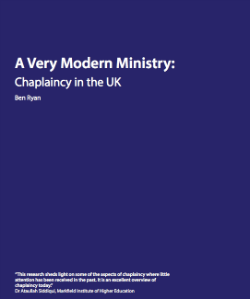Chaplaincy - to what extent is it pioneering mission?
Andrea Campanale reflects on a recent study of chaplaincy in the UK
Last month the think-tank Theos and The Cardiff Centre for Chaplaincy Studies launched a report entitled ‘A Very Modern Ministry: Chaplaincy in the UK’.
 In the introduction, author Ben Ryan outlines the apparent contradiction the research explores: “The fascination of chaplaincy is that it seems to be thriving in the paradoxical situation of being a faith and belief phenomenon which is growing in a public square which often seems increasingly secular. (p.9)”
In the introduction, author Ben Ryan outlines the apparent contradiction the research explores: “The fascination of chaplaincy is that it seems to be thriving in the paradoxical situation of being a faith and belief phenomenon which is growing in a public square which often seems increasingly secular. (p.9)”
I have developed an interest in this area of ministry as a result of working with the Chaplain at the YMCA in South West London, and Kingston University’s Faith Advisor. I have been constantly challenged and inspired by the opportunity afforded them to help people find hope and meaning for the day-to-day struggles of life, outside the bounds of organised religion.
On Valentine’s Day in the restaurant of the YMCA in Surbiton, for example, we gave away chocolates and put handmade cards on the tables celebrating God’s love. We also helped people make their own Valentine cards and one of the children living at the Y made a card for her Mum to say how much she loved her!
These opportunities to listen and find creative ways to bless others has led me to set up a Town Centre Chaplaincy Service in Kingston-upon-Thames as part of my missional activity as a Church Mission Society Lay Pioneer. I have done this with the Local Ecumenical Partnership and I see it as a means by which one of the members of my missional community, a retired social worker, outworks her vocation.
It also fulfills my intention to create different vehicles for Christians to be good news in their locality. It is by doing and reflecting on practice in community that I believe discipleship happens.
However, to what extent is chaplaincy mission? The report clearly picks up on the tensions around the concern not to be seen as ‘proselytising’. In some sectors such as healthcare and education it is very much a “no-go area”. But in sports chaplaincy and town centre chaplaincies, the report identifies a greater openness in talking about evangelism. One sports chaplain quoted the Sports Chaplaincy UK maxim that they should be “pastorally proactive and spiritually reactive (p.42).”
The report concluded that very few chaplains identified conversion as a particular hope. “At most, the intention seemed on the whole to be to encourage and deepen faith of any description. (p.43)”
So how might chaplaincy be considered pioneering? Well it’s certainly not new! Recognisable chaplains go back at least to the 19th century and that’s in the police and acting profession, as well as more ‘traditional’ chaplaincy fields such as the military, hospitals and prisons. Yet Ryan still describes it as “a ministry that is innovative, fitting in with the way British society is, rather than how religious and belief groups might hope it to be.” It is, “...a ministry that goes to where people actually are, rather than waiting for them to come to religion. (p.79)”
I was also struck by the role of chaplain as being a bridge between the institution they work for and the faith community they represent. This can be an uncomfortable position to hold and chaplains complain of feeling isolated and lacking in support from both. (p.67) Also chaplains were described as being a ‘prophetic’ figure within the organisation, willing to criticise and challenge those in authority if they felt decisions were compromising standards or discriminating against a minority group within the institution (p.46).
Certainly the scope and impact outlined in the report is encouraging. I counted 45 specific sectors where chaplains are currently operating. (p.14-16)
Yet, also like pioneering, chaplaincy is increasingly dependent upon untrained, voluntary lay people. The report ends with a note of caution, “Faith and belief groups can either act to resource, support and embrace this movement or they can let it continue organically and run the risk of losing any control they might have over a powerful resource (p.79)”.
Andrea Campanale is a lay pioneer and mission partner with the Church Mission Society. She runs a Fresh Expression called Sacred Space Kingston.
Baptist Times, 13/04/2015